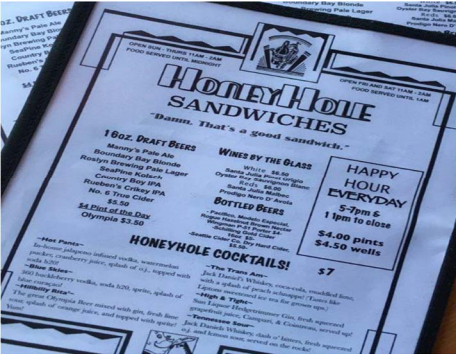The Trademark Trial and Appeal Board Finds There is “Something More” Sufficient to Show That Restaurant Services are Related to Alcoholic Beverages

In In re Honeyhole Sandwiches Inc., Serial No. 87138294, the Trademark Trial and Appeal Board (“TTAB”) agreed with the Examiner in refusing the registration of HONEYHOLE SANDWICHES because it was confusingly similar to HONEY HOLE under Section 2(d) of the Trademark Act. In this decision, a strong mark, a menu, and the private labeling trend proves to be “something more” to show that alcoholic beverages and restaurant services are related. This decision is also consistent with the trend in the Trademark Office when examining applications for food, alcoholic beverages, and restaurants in finding that seemingly unrelated goods are related, e.g. alcoholic beverages and cigars; or beers, on the one hand, and vodka on the other.
The Applicant sought registration of HONEYHOLE SANDWICHES for “restaurant with bar specializing in serving proprietary unique sandwiches, local beers and alcohol in a vibrant, eclectic environment” in Class 43. The examiner refused registration, citing the registration for the mark HONEY HOLE for “alcoholic beverages except beers” in Class 33.
In evaluating the du Pont factors, which the TTAB considers in determining a likelihood of confusion, the TTAB unsurprisingly found that the dominant part of Applicant’s mark “HONEYHOLE” was similar in sight, sound, and meaning to Registrant’s “HONEY HOLE” mark.
More notably, in looking at the similarities between the goods and services, the TTAB found that the Examiner met the “something more” requirement to show a relatedness of the goods and services. The Federal Circuit requires that “[t]o establish a likelihood of confusion a party must show something more than that similar or even identical marks are used for food products and for restaurant services.” Under this requirement, simply because a restaurant offers certain beverages does not mean that the food or beverage is related to the restaurant services.
To determine whether there is “something more” rendering the food or beverage related to restaurant services, the TTAB will examine evidence of a specific commercial relationship between the food or beverage and restaurant services and evaluate whether consumers would be likely to believe that an association exists between the food or beverage items and the restaurant services. The requirement may also be met when the registrant’s mark is a strong mark.
Here, the TTAB noted that HONEY HOLE was a strong mark and that Applicant’s application specifically included “serving …alcohol.” The TTAB also found that the Applicant’s specimen supported a finding of relatedness. The specimen identified “HONEYHOLE COCKTAILS!” as part of the menu which was used just below the HONEYHOLE SANDWICHES mark.
The TTAB also examined evidence of third-party registrations of the same mark for alcoholic beverage and restaurant services. While the TTAB noted that third-party registrations alone are insufficient to show the requisite “something more,” the Examiner also submitted evidence showing that restaurants offer private-label alcoholic beverages under the same mark for their restaurant services, as well as news articles about the trend in restaurants to offer private label alcoholic beverages. The Examiner submitted evidence of online advertising by companies offering to create private label beverage lines for restaurants. Based on this additional evidence, the TTAB found that there was probative evidence establishing that alcoholic beverages and restaurant services are similar.
Relatedly, the TTAB found that the trade and distribution channels for Registrant’s alcoholic beverages included restaurants, and that Applicant sold alcohol at its restaurants. There was no evidence of any restrictions on distribution or that the consumers were anyone other than the general public. Accordingly, the TTAB found that the trade channels and classes of consumers were similar.
This decision highlights the interesting impact that the growth in the private label alcoholic beverage has on trademark owners seeking registration. The more expansive the private label trend gets, the more related other goods and services become. For trademark owners of alcoholic beverages, this only gives further reason to do your due diligence in the beginning before investing time and financial resources in building your brand. A trademark clearance search will provide trademark owners a better understanding of potentially related goods and services that could bar federal trademark registration.
If you’d like to discuss the issues of trademark clearance or trademark registration, please contact Danielle DeFilippis at dmdefilippis@norris-law.com or Jeanne Hamburg at jhamburg@norris-law.com.



